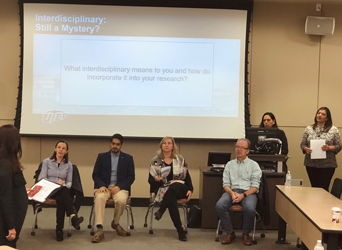PhD Students Host Panel Discussion on Interdisciplinary Research

Last week, students from the fall 2019 cohort of the Interdisciplinary Health Sciences PhD Program hosted a panel of university and community guests to discuss perceptions and barriers to interdisciplinary research.
The PhD students organized the event as one of their major class assignments in the Introduction to Interdisciplinary Health Sciences Research course, taught this fall by Dr. Shafik Dharamsi, dean of the College of Health Sciences. Dharamsi, a graduate of a PhD program in interdisciplinary studies at the University of British Columbia, indicated that the project was designed to teach students how to work through challenges as a team.
"This was not so much about demonstration of intellect or knowledge around interdisciplinary concepts. It gave the students an opportunity to actually work as a team, as they will do in the future," he said.
Guest panelists included Tracy Yellen, CEO of the Paso del Norte Foundation; Thomas Boland, professor of Biomedical Engineering at UTEP; Juan Aguilera, a PhD candidate in the IHS PhD Program, and Isabel Latz, who will graduate this fall with her PhD in Interdisciplinary Health Sciences.
Students took turns asking the panelists their views about the current and future roles of interdisciplinary research (IDR) in addressing health challenges, and what they believed were key elements in creating a successful interdisciplinary team. All panelists agreed that IDR will play a bigger role in the future, given its focus on innovation. Boland mentioned his own experience as a professor in a program that evolved from multiple interdisciplinary areas into its own field.
"The future of IDR is exciting," said Boland. "If you look at where innovation occurs, it's at the boundaries where disciplines cross."
Yellen added that, from a funder's perspective, she also believed more funding will shift towards IDR initiatives, particularly those that are focused on prevention and not simply addressing negative outcomes.
"Although it's harder to measure cause and effect (for preventative programming) and it's expensive to prove, we've already shifted some of our funding in that direction," she said. "We already know that 50% of what makes you healthy is behavior, and 20% is environment. Yet, over 90% of resources are spent on cures, and not enough is spent on prevention. In the future, I hope more funding will be directed upstream," she added.
As for the future of interdisciplinary research at UTEP, Latz suggested that more should be done to highlight the work that is already happening on campus. She mentioned her own experience in finding experts on campus in different areas that contributed to her dissertation topic, which focused on associations between individuals' perceptions of immigration policies and their physical and mental health, as well as healthcare utilization.
Aguilera agreed, adding "We have to find ways to create bridges. We have to ask 'so what?' It's not enough to just know about something, it's what we can do about it - not just learning about diabetes, but creating bridges to other disciplines to come up with solutions."
To learn more about the Interdisciplinary Health Sciences PhD Program, visit: https://www.utep.edu/chs/ihs
Go Miners!




